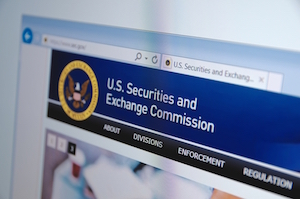 The Securities and Exchange Commission has announced that its 2021 examination priorities will include a greater focus on conflicts of interest for brokers and advisers, as well as climate-related risks. An additional focus will include attendant risks relating to FinTech in its initiatives and examinations.
The Securities and Exchange Commission has announced that its 2021 examination priorities will include a greater focus on conflicts of interest for brokers and advisers, as well as climate-related risks. An additional focus will include attendant risks relating to FinTech in its initiatives and examinations.
The Commission’s Division of Examinations publishes its examination priorities annually to provide insights into its risk-based approach, including the areas it believes present potential risks to investors and the integrity of the U.S. capital markets.
“This year, the Division is enhancing its focus on climate and ESG-related risks by examining proxy voting policies and practices to ensure voting aligns with investors’ best interests and expectations, as well as firms’ business continuity plans in light of intensifying physical risks associated with climate change,” Acting Chair Allison Herren Lee said in a statement. “Through these and other efforts, we are integrating climate and ESG considerations into the agency’s broader regulatory framework.”
The following is a snapshot of some of the Division’s 2021 examination priorities.
Retail Investors, Including Seniors and Those Saving for Retirement: The Division says that it will focus on compliance with Regulation Best Interest, Form CRS, and whether registered investment advisers have fulfilled their fiduciary duties of care and loyalty, including whether firms are appropriately mitigating conflicts of interest and disclosing conflicts where necessary. With respect to those investments heavily used by retail investors or those that may present elevated risks, the Division will continue to prioritize these products, including mutual funds, ETFs, fixed income securities, variable annuities, private placements and microcap securities.
Information Security and Operational Resiliency: The Division will continue to review business continuity and disaster recovery plans of firms, but will shift its focus to whether such plans, particularly those of systemically important registrants, are accounting for the growing physical and other relevant risks associated with climate change. The Division will also review whether registrants have taken appropriate measures to safeguard customer accounts and prevent account intrusions, including verifying an investor’s identity; overseeing vendors and service providers; addressing malicious email activities; and managing operational risk because of a work-from-home environment.
Fintech and Innovation: Examinations of market participants engaged with digital assets will continue to assess whether investments are in the best interests of investors; portfolio management and trading practices; safety of client funds and assets; pricing and valuation; effectiveness of compliance programs and controls; and supervision of representatives’ outside business activities.
Other Areas: Additional areas of focus include:
- Compliance with applicable anti-money laundering (AML) requirements, including evaluating whether broker-dealers and registered investment companies have adequate policies and procedures in place
- Preparation for the London Inter-Bank Offered Rate (LIBOR) transition
- Compliance programs of RIAs, including whether those programs and their policies and procedures are reasonably designed, implemented and maintained
- Examinations of registered funds focusing on disclosures to investors, valuation, filings with the Commission, personal trading activities, contracts and agreements, and including a review of fund governance practices and compliance programs
- Compliance with exemptive relief, including for the newly created non-transparent, actively managed ETFs
- For advisers to private funds, compliance risks, including a focus on liquidity and disclosures of investment risks and conflicts of interest; the Division will also focus on advisers to private funds that have a higher concentration of structured products, such as collateralized loan obligations and mortgage backed securities
- For broker-dealers, compliance with the Customer Protection Rule and the Net Capital Rule, including the adequacy of internal processes, procedures, controls and compliance with requirements for borrowing securities from customers
The SEC notes that the published priorities are not exhaustive and will not be the only areas the Division focuses on in its examinations, risk alerts and outreach. “Our priorities reflect the complicated, diverse, and evolving nature of the risks to investors and the markets, including climate and ESG,” notes Division Director Pete Driscoll. “In this unprecedented time, the Division is committed to continuing to adapt examination processes and find innovative ways to enhance the effectiveness of examinations and our risk-based approach. However, the bedrock of our examination program remains unchanged. The work we do, from examinations to publishing risk alerts and conducting outreach, serves our mission to promote compliance and protect investors.”
FY 2020 Activity
Looking back at 2020, the Division notes that it completed 2,952 examinations, which is a 4.4% decrease from FY 2019. “This small decrease, when viewed in light of the impact of the pandemic, is illustrative of the staff’s hard work, resiliency and dedication to the SEC’s and the Division’s mission to protect investors,” the report observes.
The Division’s coverage of RIAs in 2020, a year in which the RIA population continued to increase and the pandemic necessitated a mid-year shift to remote examining, was 15%. The Division also completed more than 100 examinations of investment company complexes. It also issued more than 2,000 deficiency letters, with many firms taking direct corrective actions in response to those letters, including by amending compliance policies and procedures; enhancing their disclosures; or returning fees back to investors, among other things.
Examinations closed in FY 2020 have so far resulted in firms returning more than $32 million to investors, the report notes. More than 130 enforcement referrals from FY 2020 exams were made so far, and the SEC anticipates more to come from its 2020 examinations.

